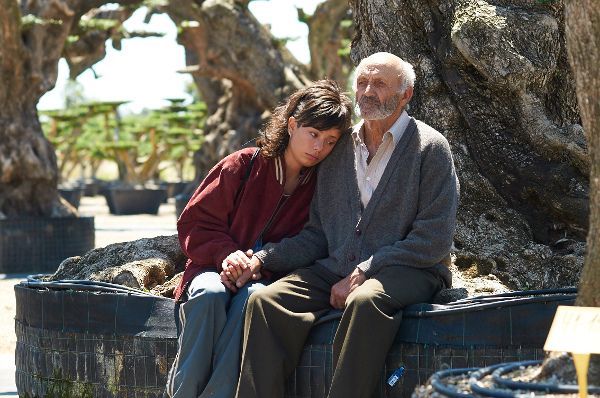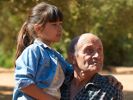Eye For Film >> Movies >> The Olive Tree (2016) Film Review
The Olive Tree
Reviewed by: Amber Wilkinson

Icíar Bollaín's family drama - written by her partner Paul Laverty - plays out like a mainstream cousin of Asier Altuna's Amama: When A Tree Falls, touching on similar ideas of the importance of family life, community and man's connection to the land in Spain. These more country-specific issues are married to global concerns about the environment and corporatisation in general.
Alma (Anna Castillo, who deservedly won a best newcomer Goya for her role) is the youngest member of her family's farming clan, spending her working hours looking after the barn-farmed chickens. When not at work, she likes to hang out, as she always has, with her grandfather (non-pro Manuel Cucala, adding an earthy authenticity). Once the sort of vibrant granddad everyone dreams of - showing her how to graft olive trees and encouraging her love of the 'monster' face in the family's 2,000-year-old specimen - he has now been reduced to silence by Alzheimer's.

Alma believes he is partially grieving for the ancient tree, which was sold by her dad (Miguel Angel Aladren, channelling Sam Waterston) against his father's wishes, with the spot now marked by a cairn of stones that her granddad adds to occasionally. His granddaughter, whose impetuousness is drawn in broad brushstrokes that Castillo's performance helps to smooth over, decides to track down the tree. To her dismay, she discovers it is 'in captivity', gracing the foyer of a German energy company in Dusseldorf.
Hatching a threadbare plot to bring it home she invents a pretext to persuade her good-natured uncle Arti (Javier Gutiérrez, on fine comedy form) and doe-eyed colleague Rafa (Pep Ambròs) to make a road trip with her to fetch it, as she desperately attempts to whip up a social media campaign as they go.
Bollaín and Laverty have tackled social issues before, in Even The Rain and Kathmandu Lullaby, but this film benefits from being more character based and less polemical. Bollaín quickly establishes the quiet of the old - symbolised by the olive groves where Ramon sits - and the chaos of the new seen in the rowdy chicken barn. Flashbacks are used judicially and organically, all gently supported by the flowing, piano-driven score by Pascal Gaigne.
The backdrop to the story also hints at the economic crisis in general, as well as the corruption of officials, that has left many in Spain's rural areas struggling to find employment. Germany doesn't escape uncriticised either, with nods the idea of the country somehow stealing jobs and the young generation from Spain apparent in Rafa's suggestion he might just "stay there".
Some of the symbolism on the trio's journey is on the hefty side - particularly a garish Statue of Liberty which ends up coming along for the ride - and Alma's tendency towards self-harm feels more of a device than an integrated part of her character. But what the film lacks in allegorical subtlety it makes up for in depth of emotion. The sight of the tree in such an alien environment is powerful but it's the film's smaller moments of solidarity that make the most impact, such as an almost imperceptible snatch of song or a sudden outburst of shared laughter over a sandwich. This is a charmingly hopeful film that has faith in the younger generation and in nature's ability to find a route - and, indeed, root - to survival.
Reviewed on: 10 Mar 2017
















